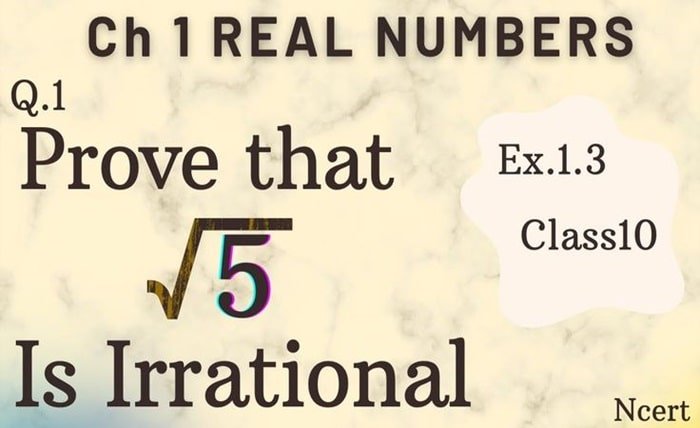Prove That Root 5 is Irrational: Understanding the Concept with Mathematical Proof

Before diving into the proof that root 5 is irrational, it’s crucial to understand what irrational numbers are. Irrational numbers are real numbers that cannot be expressed as a fraction of two integers. Unlike rational numbers, which can be written as simple ratios like ab\frac{a}{b}, where both aa and bb are integers and b≠0b \neq 0, irrational numbers cannot be neatly expressed in this form. The decimal representation of irrational numbers goes on infinitely without repeating. Famous examples of irrational numbers include π\pi, ee, and square roots of non-perfect squares, like 2\sqrt{2}, 3\sqrt{3}, and, as we will prove, 5\sqrt{5}.
What Does It Mean for a Number to Be Irrational?
To prove that root 5 is irrational, we need to establish a fundamental understanding of what being “irrational” means in mathematics. A number is irrational if it cannot be expressed as a ratio of two integers, meaning it cannot be written as pq\frac{p}{q}, where pp and qq are integers, and q≠0q \neq 0. If a number’s square root cannot be simplified into a rational number (i.e., a fraction), then that number is irrational. We will use this concept to show that root 5 is irrational through a process of logical contradiction.
Assumption: Root 5 Is Rational
To prove that root 5 is irrational, we will first assume the opposite: that root 5 is rational. This method of proof is known as proof by contradiction. We begin by assuming that 5\sqrt{5} can be written as a ratio of two integers pp and qq in its simplest form, meaning that pp and qq have no common factors (i.e., they are coprime). Therefore, we can assume:
5=pq\sqrt{5} = \frac{p}{q}
Where pp and qq are integers, and q≠0q \neq 0.
Squaring Both Sides of the Equation
Next, to eliminate the square root, we square both sides of the equation. If 5=pq\sqrt{5} = \frac{p}{q}, squaring both sides gives us:
5=p2q25 = \frac{p^2}{q^2}
This equation simplifies further when we multiply both sides by q2q^2 to eliminate the denominator:
5q2=p25q^2 = p^2
This equation states that p2p^2 is equal to 5 times q2q^2, meaning that p2p^2 is divisible by 5.
Conclusion: pp Is Divisible by 5
From the equation 5q2=p25q^2 = p^2, we can conclude that p2p^2 must be divisible by 5. If p2p^2 is divisible by 5, then pp itself must also be divisible by 5 (since the square of a number divisible by 5 is always divisible by 5). This means we can write pp as:
p=5kp = 5k
Where kk is some integer.
Substituting p=5kp = 5k into the Equation
Now that we’ve established p=5kp = 5k, we can substitute this into the equation 5q2=p25q^2 = p^2 to see how it affects the relationship between pp and qq. Substituting p=5kp = 5k into the equation gives us:
5q2=(5k)25q^2 = (5k)^2
Simplifying the right-hand side:
5q2=25k25q^2 = 25k^2
Dividing both sides by 5:
q2=5k2q^2 = 5k^2
This equation shows that q2q^2 is divisible by 5, meaning that qq must also be divisible by 5.
Contradiction: Both pp and qq Are Divisible by 5
At this point, we have shown that both pp and qq must be divisible by 5. However, this contradicts our initial assumption that pp and qq have no common factors (i.e., that they are coprime). The assumption that root 5 is rational leads to the conclusion that pp and qq share a common factor, which violates the definition of a rational number in its simplest form.
Conclusion: Root 5 Is Irrational
Because our assumption that root 5 is rational leads to a contradiction, we must conclude that root 5 is not a rational number. Therefore, root 5 is irrational. This proof by contradiction shows that it’s impossible to express 5\sqrt{5} as a ratio of two integers, confirming that root 5 is irrational.
Historical Context of Irrational Numbers
The discovery that certain numbers, like root 5, are irrational dates back to ancient Greek mathematics. The famous mathematician Pythagoras and his followers initially believed that all numbers could be expressed as ratios of whole numbers. However, the discovery of irrational numbers, starting with 2\sqrt{2}, shocked the mathematical world. Similarly, proving that root 5 is irrational continues this tradition of uncovering numbers that defy rational expression.
Importance of Proving That Root 5 Is Irrational
The proof that root 5 is irrational holds significance not just as an isolated mathematical fact but also as an important concept in various areas of mathematics. Understanding why numbers like root 5 are irrational helps in solving equations, working with real numbers, and understanding deeper mathematical concepts like number theory. By proving that root 5 is irrational, we also gain insight into the structure of numbers and how irrational numbers fit within the number system.
Applications of Irrational Numbers in Mathematics
Knowing that root 5 is irrational has applications in many branches of mathematics, including geometry, algebra, and calculus. For example, when working with circles or triangles in geometry, irrational numbers often appear in the solutions to equations involving square roots. Similarly, in algebra, proving that numbers like root 5 are irrational is crucial for solving polynomial equations and understanding the behavior of functions.
Proving Other Square Roots Are Irrational
The method used to prove that root 5 is irrational can also be applied to other non-perfect square numbers. For instance, we can prove that 2\sqrt{2}, 3\sqrt{3}, and 7\sqrt{7} are irrational by following a similar logical process of contradiction. Each proof follows the same general steps: assume the number is rational, manipulate the equation, and find a contradiction that proves the assumption wrong.
Conclusion
The proof that root 5 is irrational is a classic example of a mathematical proof by contradiction. By assuming that root 5 is rational and demonstrating that this leads to a logical contradiction, we can conclusively prove that root 5 is irrational. This proof not only deepens our understanding of irrational numbers but also illustrates the power of mathematical reasoning in solving abstract problems. As we have shown, root 5 cannot be expressed as a ratio of two integers, and thus, it is an irrational number.
FAQs
1. Why is root 5 considered irrational?
Root 5 is considered irrational because it cannot be expressed as a ratio of two integers. The proof by contradiction shows that assuming root 5 is rational leads to a contradiction, confirming that root 5 is irrational.
2. Can root 5 be simplified into a rational number?
No, root 5 cannot be simplified into a rational number. It is an irrational number, meaning its decimal representation is non-repeating and non-terminating.
3. How do you prove that root 5 is irrational?
To prove that root 5 is irrational, you assume it is rational, express it as a fraction, and show that this assumption leads to a contradiction. This proof demonstrates that root 5 cannot be written as a ratio of two integers.
4. Are all square roots irrational?
No, not all square roots are irrational. The square roots of perfect squares, such as 4=2\sqrt{4} = 2 and 9=3\sqrt{9} = 3, are rational. However, the square roots of non-perfect squares, like 2\sqrt{2}, 3\sqrt{3}, and 5\sqrt{5}, are irrational.
5. What are some examples of irrational numbers besides root 5?
Some common examples of irrational numbers include π\pi, ee, 2\sqrt{2}, 3\sqrt{3}, and 7\sqrt{7}. These numbers cannot be expressed as simple fractions and have non-repeating, non-terminating decimal expansions.




